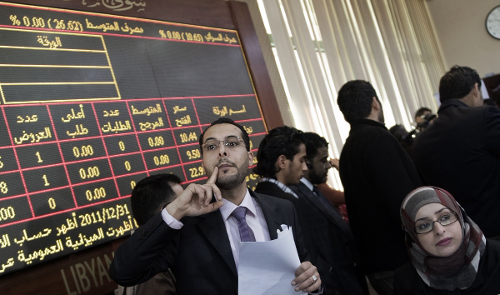Libya’s stock market resumes trading after 9-year closure

After a hiatus of over nine years due to political and security challenges, Libya's Stock Market reopened in the capital, Tripoli, on Monday. The event was commemorated with a ceremony attended by the Prime Minister of the Government of National Unity, Abdulhamid al-Dbeibah, and the Chairman of the Board of Directors, Bashir Mohamed Ashour, alongside other dignitaries.
Prime Minister al-Dbeibah underscored the significance of the stock market as a crucial economic instrument. He noted, "The importance of the stock market is embodied in doubling the gross domestic product and helping to close the budget deficit, which reduces the burden on the state’s general budget."
Ashour, the Chairman of the Board, stressed that the success of the market would be contingent on the "stability and development of the various sectors of the state." The reopening marks a milestone for Libya, signaling efforts toward economic revitalization and stability in the region.
Key Takeaways
Despite the reopening, the initial trading day experienced limited activity. Out of the ten listed companies, only three were actively traded, as reported by Lamin Haman, the market's media adviser. The market, originally inaugurated in 2006, faced interruptions following the NATO-backed uprising in 2011 and subsequent civil strife in 2014, leading to the suspension of trading on multiple occasions. Notably, the conflict resulted in the division of Libya between warring eastern and western factions, complicating the nation's economic recovery. The resumption of stock market operations signals a step towards economic normalization and recovery in Libya. Its impact is poised to reach beyond Tripoli, as it also oversees a trading hall in Benghazi, Libya's second-largest city. Reports suggest that trading is expected to recommence in Benghazi next week, reflecting a broader initiative to revive financial activities across the entire country.

Next Frontier
Stay up to date on major news and events in African markets. Delivered weekly.
Pulse54
UDeep-dives into what’s old and new in Africa’s investment landscape. Delivered twice monthly.
Events
Sign up to stay informed about our regular webinars, product launches, and exhibitions.




